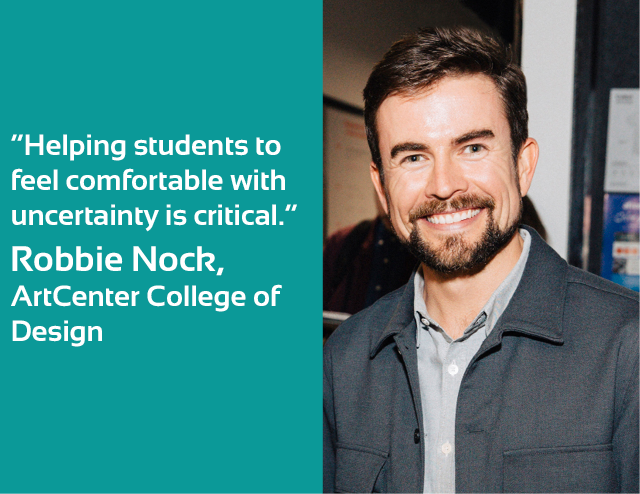
We continue our series highlighting educators within the VentureWell network who are doing good work—faculty members who are catalyzing change in higher education and inspiring students to impact the world through invention.
This month’s faculty spotlight is Robbie Nock, Director of Entrepreneurship and Professional Practice at ArtCenter College of Design. Nock provides students and alumni with the necessary business education, techniques, funding, and network to grow new ventures and thrive in rapidly changing industries. Nock is an active member of the VentureWell community, serving as a Principal Investigator for a Faculty Grant.
How did you get interested in teaching entrepreneurship?
While studying at the University of Edinburgh, I started a photography and media production studio, which taught me invaluable entrepreneurial skills. From there I joined an MFA program in Art and Technology at CalArts, where I launched a mapping software startup. At that time, I saw an opportunity to help fellow creatives learn from my business and startup experience. Since then, I have advocated for teaching entrepreneurship to designers and artists. I feel strongly that their studio training fosters a skill set that is particularly well-suited to startups and innovation more broadly. Teaching creatives new ways to realize their visionary ideas and partner with collaborators outside the creative industry is an exciting and personally meaningful challenge.
What is your favorite thing about teaching?
Sometimes students assume that the business components of their work are burdensome and unapproachable. I’ve made it my mission to help them think about and access opportunities in areas outside of their expected paths.
Where would you like to see the field of entrepreneurship in five years?
I would like to see the entrepreneurship community widen the definition of validation, especially when teams or ideas originate outside of the established business and startup world. For instance, I frequently meet founders and innovators—particularly in the fields of environmental and social entrepreneurship—who have significant momentum but lack the financial metrics to access capital and formal mentorship programs.
What traits make for great teachers, advisors, and mentors?
Empathy for students is essential. Listening to needs, being open to alternative approaches, and helping students to feel comfortable with uncertainty is critical.
What books on entrepreneurship and innovation have you been reading lately?
I refer to Bill Aulet’s Disciplined Entrepreneurship frequently. It contains useful tools and practical exercises for startups and established businesses at almost any stage. I also regularly listen to Z Holly’s Art of Manufacturing podcast, a terrific window into the lives of working entrepreneurs. [Editor’s note: Read an excerpt of Bill Aulet’s book, Disciplined Entrepreneurship Workbook, on our blog.]
What’s your most useful classroom activity or assignment?
The most important activity for students in our Launch Lab program is capturing clear, actionable feedback from potential customers and users. Students tend to have a wide range of prior experience in gathering this first-hand research. We start with Strategyzer’s Ground Rules for Interviewing to develop technique and create an outline for interviews. Students then test this on campus with fellow students, faculty and staff, practicing and refining their questions before contacting interviewees in the market that they seek to enter. Prototyping their interview technique in this way compliments the iterative product development process as they work towards demonstrating viability and market fit.